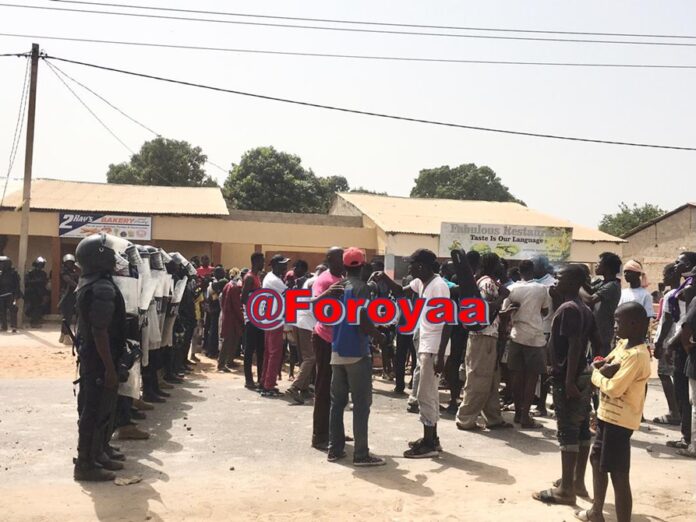By Louise Jobe & Hatab Nyang
A trial magistrate in Brikama has on Wednesday, 24th March discharged twenty-two Sanyang youths, who were facing charges of arson and three other criminal counts following the 15th March violent protest in the coastal town.
Principal Magistrate Isatou Dabo of the Brikama Magistrate’s Court said: “She: “The practice of mentioning cases at the magistrates court and applying for transfer to the high court on a basis of lack of jurisdiction seems to be a tactic by the prosecution to legitimize the detention of the accused persons pending such time they are ready to file a fresh indictment at the High court. The court cannot be used to legitimize what is unjust procedurally especial where it is certain the procedures to be followed before an indictment is filed is one that does not happened overnight.”
On that basis, she discharged the accused persons and ordered for the case to be transferred to the Special Criminal Division of the High Court.
Magistrate Dabo made this ruling in the case of the Inspector General of Police and 22 Sanyang youths. The ruling was premise on the contention on the prosecution and on the application for the case to be transferred to the High court and the bail application for bail by the Defence.
She transferred the case to the Special Criminal Division of the high for lack of jurisdiction to try the case. Equally, she raised the question as to what basis does her court has to remand the accused persons since the prosecution deems that her court does not have jurisdiction to hear and determine the case.
She said even where she decides to grant bail the high court will not be bound by such bail conditions.
“This leaves a deadlock of processes adopted by this court under these circumstances,” she said.
The prosecution relied on section 62 of the Criminal Procedure Code (CPC) Legal Notice Number 3 of 2009 in making their application for the matter to be transferred to the high court.
Lead counsel for the Defence Lamin S. Camara said by virtue of section 5 (2) of the CPC, the court has jurisdiction to hear and determine the case adding the Legal Notice cited by the prosecution does not oust the court its power to try the case. Lawyer Camara said the said the Legal Notice relates to administrative and not judicial powers of the Chief justice. He argued that the powers conferred on the courts are given by an Act of National Assembly and not the Chief Justice. He submitted that section 2 of the said practice directive (Legal Notice) established a Special Criminal Division and its jurisdiction is only capital offences. He argued that the provisions of the Legal Notice do not take away the powers of the other courts to try capital offences.
The Magistrate held that the arson and rioters demolishing building charges are grave charges which carry a term of imprisonment for life.
“It is important to state that the magistrate court is a court of summary jurisdiction and I do not consider an offence attracting such grave punishment suitable for summary trial. Same may be prejudicial to the accused persons,” she said.
She held that the purpose of the establishment of the Special Criminal Division is in the interest of effective case management and expeditious disposal of cases involving capital offences.
“In the interest of justice I deem it fit to have the case transferred to the SCD of the high court for it will be in the best interest of justice and fair hearing for the trial will not be on a summary basis,” she said.
She said capital offences appears to be lengthy in nature and it is a constitutional requirement that accused persons be given all reasonable facilities and time to prepare for their defense.
On the bail application, she said: “I have averted my mind to the counts against the accused persons in this case as discussed under the basis for transfer of this matter to the SCD of the high court. There is need to refer to section 175 of the CPC on the procedure to be adopted in cases of offences proving unsuitable for summary trial.
She said it states: “If in the course of a trial before a subordinate court, it appears to the magistrate at any stage of the proceedings before the signing of judgement that the case is one which ought tbe tried by the high court, the magistrate shall stop the proceedings.”
She explained that where the trial is stopped, the CPC provides that the magistrate shall expunge from the record the accused persons answer to the charge and if the accused person had already been called upon to enter his or her defense, the magistrate shall expunge the minutes of the defense from the record and discharge the accused person and order the case to be transferred to the high court
She said the said provision is very clear as to the procedure to be adopted where the basis for transfer is due to the charge being considered unfit for summary trial.
“The emphasis on the procedure to be adopted is mandatory as the word shall is repeatedly used. As per the particulars of offence especially on count 2 and 4, I consider the circumstances of the case and the charges to be serious in nature.,” she ruled.


















